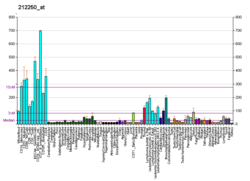メタドヘリン
メタドヘリン(英: metadherin、MTDH)、 LYRIC(lysine-rich CEACAM1 co-isolated)、またはAEG-1(astrocyte elevated gene 1)は、ヒトではMTDH遺伝子にコードされるタンパク質である[5][6][7]。
機能
[編集]MTDH(AEG-1)は、HIF-1αを介した血管新生に関与している。MTDHはSND1とも相互作用してRNA誘導サイレンシング複合体(RISC)とも関係し、RISCやmiRNAの機能に非常に重要な役割を果たしている[8][9]。MTDHは細胞核でスプライソソームタンパク質とも相互作用し、選択的スプライシング過程を調節していることが示されている[10]。
MTDHはLSF(Late SV40 factor)/TFCP2と呼ばれるがん遺伝子を誘導する。LSF/TFCP2はチミジル酸シンターゼの誘導とDNA生合成に関与している[11]。LSF/TFCP2はMMP9の転写をアップレギュレーションすることで、血管新生を亢進する[12]。
臨床的意義
[編集]MTDHは、メラノーマ、悪性神経膠腫、乳がん、肝細胞がんにおいてがん遺伝子として作用する[13]。MTDHはこれらのがんで高度に発現しており、その発生とプログレッションを補助している。MTDHはがん遺伝子であるc-Mycによって誘導され、がん細胞の足場非依存性増殖(転移)に重要な役割を果たしている。
MTDHの過剰発現は乳がんの40%以上でみられ、臨床的予後不良と関係している。MTDHは播種性転移の促進と化学療法抵抗性の向上という二重の役割を担っている。そのため、MTDHは化学療法の効果を高め、転移を抑えるための治療標的としての可能性がある[14][15][16][17]。miRNAによるMTDHの人為的ノックダウンは、乳がんにおいてがん抑制機能を有する可能性がある[18]。
MTDHは前立腺がんでも過剰発現していることが示されている。そこでは細胞質へより多く局在する変化が生じており、予後不良の指標となる[19][20]。前立腺がん細胞の細胞核では、MTDHはCD44などの遺伝子の選択的スプライシングに影響を与えていることが示されており、前立腺がんのプログレッションと関係している可能性もある[10]。
MTDHによって誘導されるLSF/TFCP2は、化学療法抵抗性、上皮間葉転換、アレルギー応答、炎症、アルツハイマー病など、多面的役割を果たす[21]。
相互作用
[編集]MTDHは次に挙げる因子と相互作用することが示されている。
出典
[編集]- ^ a b c GRCh38: Ensembl release 89: ENSG00000147649 - Ensembl, May 2017
- ^ a b c GRCm38: Ensembl release 89: ENSMUSG00000022255 - Ensembl, May 2017
- ^ Human PubMed Reference:
- ^ Mouse PubMed Reference:
- ^ “Entrez Gene: MTDH metadherin”. 2023年7月9日閲覧。
- ^ “Metadherin, a cell surface protein in breast tumors that mediates lung metastasis”. Cancer Cell 5 (4): 365–74. (April 2004). doi:10.1016/S1535-6108(04)00079-0. PMID 15093543.
- ^ “3D3/lyric: a novel transmembrane protein of the endoplasmic reticulum and nuclear envelope, which is also present in the nucleolus”. Experimental Cell Research 294 (1): 94–105. (March 2004). doi:10.1016/j.yexcr.2003.11.020. PMID 14980505.
- ^ “Increased RNA-induced silencing complex (RISC) activity contributes to hepatocellular carcinoma”. Hepatology 53 (5): 1538–48. (May 2011). doi:10.1002/hep.24216. PMC 3081619. PMID 21520169.
- ^ “Astrocyte elevated gene-1 (AEG-1): A multifunctional regulator of normal and abnormal physiology”. Pharmacology & Therapeutics 130 (1): 1–8. (April 2011). doi:10.1016/j.pharmthera.2011.01.008. PMC 3043119. PMID 21256156.
- ^ a b “The Oncogene Metadherin Interacts with the Known Splicing Proteins YTHDC1, Sam68 and T-STAR and Plays a Novel Role in Alternative mRNA Splicing”. Cancers 11 (9): 1233. (September 2019). doi:10.3390/cancers11091233. PMC 6770463. PMID 31450747.
- ^ “Identification of genes conferring resistance to 5-fluorouracil”. Proceedings of the National Academy of Sciences of the United States of America 106 (31): 12938–43. (August 2009). Bibcode: 2009PNAS..10612938Y. doi:10.1073/pnas.0901451106. PMC 2722317. PMID 19622726.
- ^ “Late SV40 factor (LSF) enhances angiogenesis by transcriptionally up-regulating matrix metalloproteinase-9 (MMP-9)”. The Journal of Biological Chemistry 287 (5): 3425–32. (January 2012). doi:10.1074/jbc.M111.298976. PMC 3270996. PMID 22167195.
- ^ “Astrocyte elevated gene-1 regulates hepatocellular carcinoma development and progression”. The Journal of Clinical Investigation 119 (3): 465–77. (March 2009). doi:10.1172/JCI36460. PMC 2648696. PMID 19221438.
- ^ “MTDH activation by 8q22 genomic gain promotes chemoresistance and metastasis of poor-prognosis breast cancer”. Cancer Cell 15 (1): 9–20. (January 2009). doi:10.1016/j.ccr.2008.11.013. PMC 2676231. PMID 19111877.
- ^ “Small-molecule inhibitors that disrupt the MTDH–SND1 complex suppress breast cancer progression and metastasis” (英語). Nature Cancer 3 (1): 43–59. (2021-11-29). doi:10.1038/s43018-021-00279-5. ISSN 2662-1347. PMC 8818087. PMID 35121987.
- ^ “Pharmacological disruption of the MTDH–SND1 complex enhances tumor antigen presentation and synergizes with anti-PD-1 therapy in metastatic breast cancer” (英語). Nature Cancer 3 (1): 60–74. (2021-11-29). doi:10.1038/s43018-021-00280-y. ISSN 2662-1347. PMC 8818088. PMID 35121988.
- ^ “New cancer therapy from Yibin Kang's lab holds potential to switch off major cancer types without side effects” (英語). Princeton University. 2021年12月10日閲覧。
- ^ “Establishment and characterization of MTDH knockdown by artificial MicroRNA interference - functions as a potential tumor suppressor in breast cancer”. Asian Pacific Journal of Cancer Prevention 13 (6): 2813–8. (2012). doi:10.7314/apjcp.2012.13.6.2813. PMID 22938464.
- ^ “Knockdown of astrocyte-elevated gene-1 inhibits prostate cancer progression through upregulation of FOXO3a activity”. Oncogene 26 (55): 7647–55. (December 2007). doi:10.1038/sj.onc.1210572. PMID 17563745.
- ^ “LYRIC/AEG-1 is targeted to different subcellular compartments by ubiquitinylation and intrinsic nuclear localization signals”. Clinical Cancer Research 15 (9): 3003–13. (May 2009). doi:10.1158/1078-0432.CCR-08-2046. PMID 19383828.
- ^ “The transcription factor LSF: a novel oncogene for hepatocellular carcinoma”. Am J Cancer Res 2 (3): 269–285. (2012). PMC 3365805. PMID 22679558.
- ^ “Astrocyte elevated gene-1 promotes hepatocarcinogenesis: novel insights from a mouse model”. Hepatology 56 (5): 1782–91. (November 2012). doi:10.1002/hep.25868. PMC 3449036. PMID 22689379.
- ^ “Identification of Nucleolin as a Novel AEG-1-Interacting Protein in Breast Cancer via Interactome Profiling”. Cancers 13 (11): 2842. (June 2021). doi:10.3390/cancers13112842. PMC 8201222. PMID 34200450.
- ^ “A novel metadherinΔ7 splice variant enhances triple negative breast cancer aggressiveness by modulating mitochondrial function via NFĸB-SIRT3 axis”. Oncogene 39 (10): 2088–2102. (March 2020). doi:10.1038/s41388-019-1126-6. PMID 31806873.
関連文献
[編集]- “Astrocyte elevated gene-1: recent insights into a novel gene involved in tumor progression, metastasis and neurodegeneration”. Pharmacology & Therapeutics 114 (2): 155–70. (May 2007). doi:10.1016/j.pharmthera.2007.01.010. PMC 2039930. PMID 17397930.
- “Gene expression profiling predicts clinical outcome of breast cancer”. Nature 415 (6871): 530–6. (January 2002). doi:10.1038/415530a. hdl:1874/15552. PMID 11823860.
- “3D3/lyric: a novel transmembrane protein of the endoplasmic reticulum and nuclear envelope, which is also present in the nucleolus”. Experimental Cell Research 294 (1): 94–105. (March 2004). doi:10.1016/j.yexcr.2003.11.020. PMID 14980505.
- “Metadherin, a cell surface protein in breast tumors that mediates lung metastasis”. Cancer Cell 5 (4): 365–74. (April 2004). doi:10.1016/S1535-6108(04)00079-0. PMID 15093543.
- “Identification of a novel protein, LYRIC, localized to tight junctions of polarized epithelial cells”. Experimental Cell Research 300 (1): 134–48. (October 2004). doi:10.1016/j.yexcr.2004.06.026. PMID 15383321.
- “Cloning and characterization of HIV-1-inducible astrocyte elevated gene-1, AEG-1”. Gene 353 (1): 8–15. (June 2005). doi:10.1016/j.gene.2005.04.006. PMID 15927426.
- “Global, in vivo, and site-specific phosphorylation dynamics in signaling networks”. Cell 127 (3): 635–48. (November 2006). doi:10.1016/j.cell.2006.09.026. PMID 17081983.
- “Astrocyte elevated gene-1 (AEG-1) is a target gene of oncogenic Ha-ras requiring phosphatidylinositol 3-kinase and c-Myc”. Proceedings of the National Academy of Sciences of the United States of America 103 (46): 17390–5. (November 2006). Bibcode: 2006PNAS..10317390L. doi:10.1073/pnas.0608386103. PMC 1859939. PMID 17088530.






